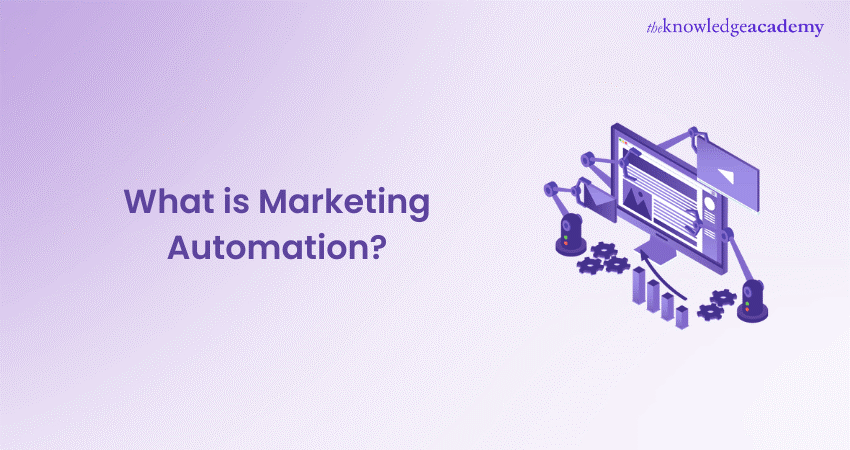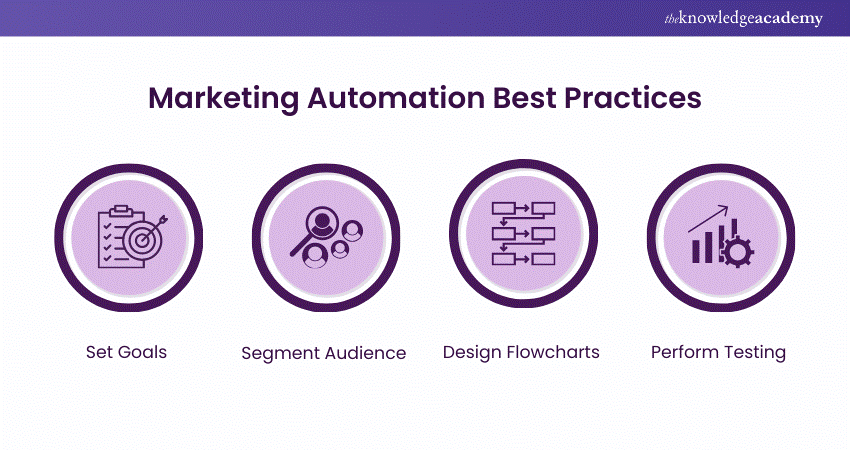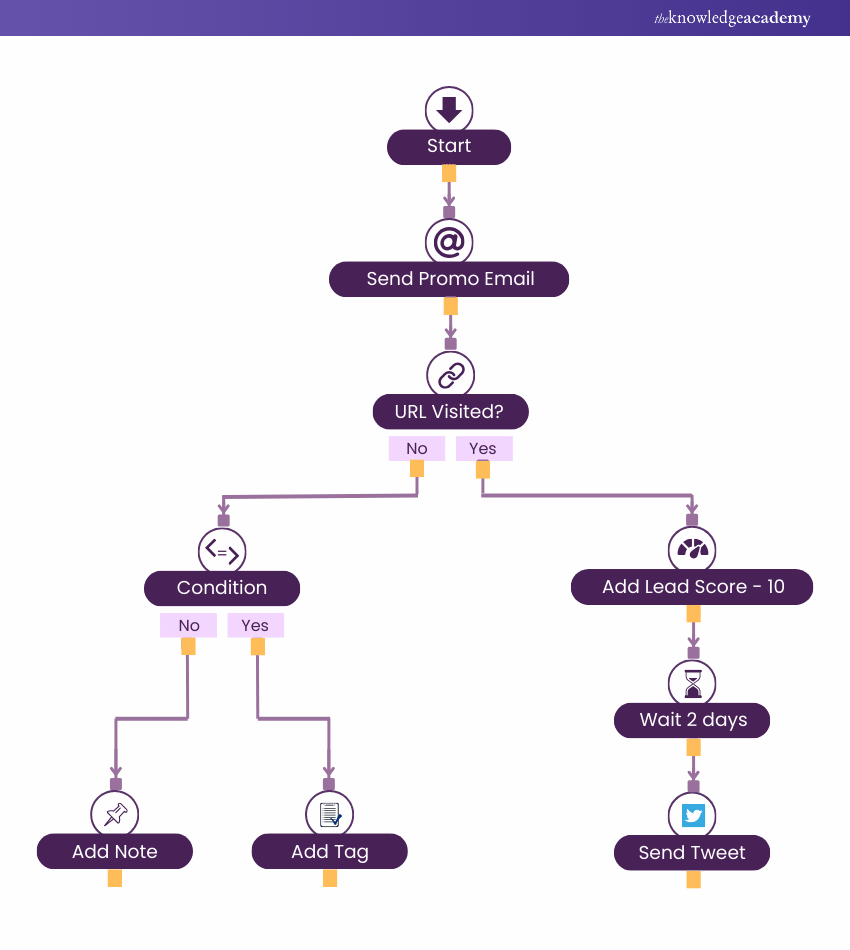We may not have the course you’re looking for. If you enquire or give us a call on +45 89870423 and speak to our training experts, we may still be able to help with your training requirements.
We ensure quality, budget-alignment, and timely delivery by our expert instructors.

Imagine reaching the right customers with just the right message at the perfect moment without lifting a finger. Welcome to the world of Marketing Automation, where technology becomes your marketing ally, helping you engage customers, nurture leads, and track performance across channels.
In this blog, we’ll dive into how automation is revolutionising the marketing landscape, offering businesses more than just efficiency: it’s about enhancing relevance, driving engagement, and amplifying impact.
From sending targeted emails to personalising social media campaigns, Marketing Automation does the heavy lifting so you can focus on strategy and creativity. Continue reading to examine how it works, its benefits, and the best practices? Let’s explore the potential of automation in transforming your marketing efforts.
Table of Contents
1) What is Marketing Automation?
2) How Marketing Automation Works?
3) Marketing Automation Impact on Customers
4) Advantages of Marketing Automation
5) How Marketing Automation Helpful in Business?
6) Marketing Automation Best Practices
7) Conclusion
What is Marketing Automation?
Marketing automation means using software for customer interactions or for business processes that are carried out by people. Marketing automation can assist the small business marketers in executing their strategy while still being realistic.
This technology is most beneficial when you already have a subscriber base and the development plan you wish to follow although it is a good avenue to secure new customers and leads.
Here’s just one case of what Marketing Automation software can contribute to your business: It allows marketers to assess which components of an advertised campaign have been deployed and which of them are effective, and, therefore, should be tweaked.
That way you’re not always being forced to zig when a customer zags, you can figure out which one makes the most sense for your customer journey that a Marketing Automation platform should perform initially.
How Marketing Automation Works?
The ways of adopting customer insights include emails, visits on the company’s website and applications, social media, and many more. Such data also assist in developing a complete picture of every consumer.
From there, Marketing Automation takes over all the segmentation and targeting exercises needed to identify the right audience's passive or active across the marketing funnel. Applying customised marketing messages to a particular customer owing to the details given in his or her profile.
Suppose a marketer is organising a webinar in front of an audience to present your product or service to the world. Here’s how Marketing Automation steps in:
a) Invitation Email: Use the email list to invite new leads to the webinar.
b) Form Submission: Because of this, leads complete a form in order to register for the webinar. The automation tool puts them in a separate email list.
c) Nurture Campaign: All such people are sent a string of fully automated e-mails—each of them gets a thank-you e-mail for participating in the webinar. Then, a few days later, they are sent to download a similar case study they could use for their reference, much like the Nature vs Nurture debate explores how different influences shape individual understanding.
d) Sales Handoff: Leads will also open the case study and route forms back to the sales team for further communications and closing. These leads are hence more qualified, are located lower in the marketing funnel and closer to making a purchase.
Marketing Automation Impact on Customers
Marketing automation has a profound impact on how businesses interact with customers, creating a more tailored and efficient experience. Here’s how:
Deliver More Relevant Content
By automating the process of marketing companies are able to classify audience and be very particular with the content they want to be sent to the customers as a way of considering the type of customers and what they want or have shown interest in. This relevance increases people’s participation and makes them remain loyal.
Provide Quicker, More Accurate Responses
Customers can also attend to their inquiries instantly through a chatbot service or automatically responding to emails. Such speed not only brings benefits in terms of the customer experience but is also effective in raising brand reliability and trust.
Create Seamless Omnichannel Experiences
Across channels, that are differentiated and compelling, it becomes possible through the use of automation. Regardless of whether a customer is communicating via e-mail, social networks, or a corporate site, they will receive consistent messages aligned with the interaction they have with the brand.
Understand the importance of marketing strategy in business with Business Marketing Strategies Training!
Advantages of Marketing Automation
The following are the Marketing Automation Advantages which are helpful:

Gain Deeper Insights into Customers
Customers appreciate consistency and personalised service. When they feel valued through personalised interactions, they are more likely to return. Marketing automation ensures you never miss important dates like birthdays, anniversaries, or VIP opportunities, allowing you to connect with your customers on a personal level.
Customers also seek assurance that they are a priority. Offering your key customers early access to sales and events before the general public makes them feel special and appreciated.
Implement Complex Strategies Easily
Being strategic with your marketing communications goes beyond simply reaching out to your contacts repeatedly. It’s about thoughtfully planning when interactions with potential shoppers or customers will be most impactful.
Many companies use drip campaigns to send a series of pre-written emails at regular intervals. However, there are also advanced automation tools that allow marketers to design and implement more complex strategies.
For instance, Mailchimp’s Customer Journey Builder enables you to create emails that reach people at the most relevant moments. Additionally, it helps you organise, clean, and manage your audience based on their engagement.
Enable Team to Focus on Strategic Tasks
More automation solutions are now found in digital marketing, which aids the marketers in the subject of being more productive. Thus, armed with Boonville as a case example, we can suggest that, by automating some of the manual, repetitive tasks that they have to perform individually. They’re able to focus on the more rewarding aspects of their work as well as the strategic aspect of lead nurturing and customer retention.
When your team is automatically scheduling and sending out the marketing messages for instance, you are able to streamline the customer experience. Hence it enables you to join other chats to deal with inquiries and complaints among others.
Equip yourself with our Essential Marketing Research Training - Register now!
Save Time and Resources
Marketing automation can save you time, boost engagement, optimise your marketing efforts, and positively impact your bottom line through workflow automation. It allows you to give your customers personalised attention with thoughtful, genuine messages that feel like they’re coming from a friend, whether you have a hundred fans or millions.
For example, you can use merge tags in emails to start with the customer’s name or reach out to them on special occasions like birthdays.
How Marketing Automation Helpful in Business?
Below are the ways in which Marketing Automation is Helpful in Businesses:
Personalised Workflows
These workflows guide qualified prospects to valuable content, turning them into warm leads that can be thoughtfully nurtured into customers. Marketing automation goes beyond this initial stage.
By keeping the customer at the center of the flywheel, businesses can continue to engage them with personalised workflows, fostering loyalty and encouraging repeat purchases. This approach also inspires customers to refer to their friends and family.
Optimised Processes
Unite your entire company with optimised processes that prioritise your customers. Develop workflows that span across different functional teams to minimise customer effort at every stage of their journey. Break down silos and collaborate to deliver a seamless customer experience from the initial interaction to well beyond the purchase.
Best Practices for Marketing Automation
The following are the best practices of Marketing Automation:

Set Goals
Gather all the information on your current marketing strategies and define your goals for automation. This will assist you in tracking your progress effectively. Additionally, look for examples of successful Marketing Automation campaigns to inspire your efforts.
Segment Audience
Marketing automation is most efficient when it is highly targeted. Your target audience should be determined by the products or services and your customer base. Segmentation is crucial for successful automation, so it’s important to take your time with it. It’s better to do it correctly than to just rush the process.
Design Flowcharts
Flowcharts serve as a visual aid to outline your workflows, simplifying the design and management of complex automation sequences. They allow you to see each step in the process clearly and ensure a logical progression of actions, which is particularly helpful for troubleshooting and refining workflows.

Perform Testing
Consistent testing of your workflows and campaigns is crucial for smooth operation. Perform A/B tests on automated emails, landing pages, or workflows to find the most effective setups. Testing helps you spot and resolve issues, ensuring your automation consistently meets your objectives.
Conclusion
Marketing Automation isn’t just the next big thing, it’s the system by which any mass-market organisation that believes it can talk to its consumers and deliver customised communications at scale should be communicating with it. Marketing Automation provides an opportunity in growing the interactivity between companies and their customers, managing resources, and achieving overall efficiency.
Build a strong foundation with our expert led Introduction To Marketing Training - Join today!
Frequently Asked Questions
What are the Four Pillars of Marketing Automation?

The four key components of Marketing Automation are:
a) Lead Generation: Attracting and capturing potential customers.
b) Lead Nurturing: Building relationships through personalised content.
c) Customer Segmentation: Grouping audiences for targeted messaging.
d) Analytics & Reporting: Measuring performance to optimise strategies.
Who is the Father of Modern Marketing?

The Father of Modern Marketing is Philip Kotler, an American professor and author renowned for revolutionising marketing theory and practice. His work introduced a customer-centric approach and strategic marketing concepts, emphasising the importance of understanding consumer needs to drive business success.
What are the Other Resources and Offers Provided by The Knowledge Academy?

The Knowledge Academy takes global learning to new heights, offering over 30,000 online courses across 490+ locations in 220 countries. This expansive reach ensures accessibility and convenience for learners worldwide.
Alongside our diverse Online Course Catalogue, encompassing 19 major categories, we go the extra mile by providing a plethora of free educational Online Resources like News updates, Blogs, videos, webinars, and interview questions. Tailoring learning experiences further, professionals can maximise value with customisable Course Bundles of TKA.
What is The Knowledge Pass, and How Does it Work?

The Knowledge Academy’s Knowledge Pass, a prepaid voucher, adds another layer of flexibility, allowing course bookings over a 12-month period. Join us on a journey where education knows no bounds.
What are the Related Courses and Blogs Provided by The Knowledge Academy?

The Knowledge Academy offers various Marketing Courses, including the Introduction to Marketing Training, Marketing Budget Course and the Marketing Research Training. These courses cater to different skill levels, providing comprehensive insights into Brand Strategy.
Our Digital Marketing Blogs cover a range of topics related to Marketing Strategies, offering valuable resources, best practices, and industry insights. Whether you are a beginner or looking to advance your Business Marketing Management skills, The Knowledge Academy's diverse courses and informative blogs have got you covered.
Upcoming Digital Marketing Resources Batches & Dates
Date
 Introduction to Marketing Training
Introduction to Marketing Training
Fri 14th Mar 2025
Fri 9th May 2025
Fri 11th Jul 2025
Fri 12th Sep 2025
Fri 14th Nov 2025






 Top Rated Course
Top Rated Course



 If you wish to make any changes to your course, please
If you wish to make any changes to your course, please


